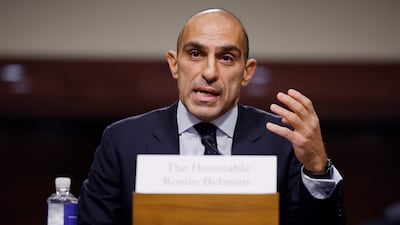The collapse of cryptocurrency exchange FTX has highlighted the consequences of not having stringent and uniform standards to govern the digital assets market, Commodity Futures Trading Commission chairman Rostin Behnam has said.
During his testimony before the US Senate Committee on Agriculture, Nutrition and Forestry on Thursday, Mr Behnam emphasised the need for a robust regulatory approach and strong guardrails to thwart future risks.
“The events of the past few weeks embody … the perilous state of the digital asset market … we are here today because many Americans invested in a novel product and will likely lose money because digital asset markets lack the basic protections,” Mr Behnam said.
“With nominal barriers to entry for new products and new consumers, massive speculative interest has taken the place of legitimate market forces, putting the American public at significant risk … we need to move quickly on a thoughtful regulatory approach to establish guardrails in these fast-growing markets of evolving risk.”

FTX filed for bankruptcy protection in the US on November 11 in the highest-profile cryptocurrency exchange failure to date, after traders pulled $6 billion from the platform over the course of three days and rival exchange Binance abandoned a rescue deal, Reuters reported.
Sam Bankman-Fried, who cofounded FTX with Gary Wang and Nishad Singh in 2019, also resigned as chief executive after discussions with his father, Joseph Bankman of Stanford Law School, and his lawyers, the company’s 30-page bankruptcy filing showed.
Mr Behnam said the CFTC lacked the direct authority to write rules and to oversee this marketplace and it may only reach it when fraud or manipulation has already occurred.
“While we can and do hold perpetrators accountable when we find fraud or manipulation, for the victims of the scheme, it is already too late,” he said.
Founded in 1975, the mission of the Washington-headquartered CFTC is to promote the integrity, resilience and vibrancy of the US derivatives markets through sound regulation, it said on its website.
“The fraud that we are able to prosecute is likely a fraction of what exists in the shadows,” Mr Behnam continued. “Limited enforcement authority is no substitute for comprehensive regulation in which trading platforms, dealers, custodians and other critical infrastructure participants are required to be registered and subject to direct oversight by a regulator.
“Failure to act will leave consumers who have made investments in digital commodities largely unprotected.”
After the FTX collapse, the US Congress began to work on discovering the issues that caused the collapse and how such incidents could affect end-consumers and the overall industry.
Thursday’s hearing focused on gaining a better view of the cryptocurrency ecosystem and learning how to avoid future incidents.
Despite its limitations, the CFTC has brought more than 60 cases in the digital asset space since 2014, with total penalties of a little more than $820 million. In fiscal year 2022, more than 20 per cent of its 82 enforcement actions involved digital assets.
“At worst, Sam Bankman-Fried and his inner circle lied to and stole from over one million customers, some of whom have lost their life savings. Meanwhile the fallout continues across the crypto ecosystem,” Debbie Stabenow, a Michigan Democrat, said.
“Because crypto assets can be used in many different ways, no single financial regulator has the authority or the expertise to regulate the entire industry. The crisis created by FTX further confirmed the need … [for a whole] government approach to regulate this market.”
Mr Behnam also called for greater involvement by regulators with respect to the adoption of new technologies.
“Specifically, I called for industry engagement in assessing risk, legal and regulatory certainty, education for the general public, and questioning and challenging the status quo in the market and within regulatory structures,” he said.


